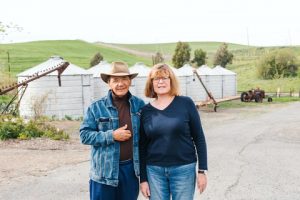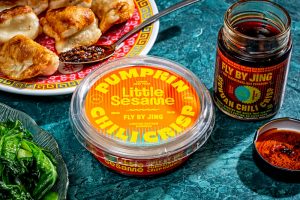
Niman Ranch recently honored Jeanne McCormack and her husband Al Medvitz of McCormack Ranch in Rio Vista, Calif. for 30 years of partnership, with the ranchers supplying sustainably and humanely raised lamb to the premium meat brand since 1993. (Photo: Business Wire)
Niman Ranch recently honored Jeanne McCormack and her husband Al Medvitz of McCormack Ranch in Rio Vista, Calif. for 30 years of partnership, with the ranchers supplying sustainably and humanely raised lamb to the premium meat brand since 1993. Not only is the ranch the first lamb producer in the network, but McCormack and Medvitz were instrumental in the founding of the Niman Ranch Pork Company when they connected their Peace Corps friend and Iowa hog farmer Paul Willis to Bill Niman, a California cattle rancher and Niman Ranch founder who was selling their lamb along with his beef to farm-to-table Bay Area restaurants.
“Were it not for Jeanne and Al’s introduction, there would be no Niman Ranch today,” said Willis, Niman Ranch’s founding hog farmer. “Locally, they have preserved a very special place through their sustainable grazing practices that have been passed down over generations. Nationally, they have helped build a company that supports over 600 farmers and ranchers today, together producing specialty products for our country’s culinary leaders.”
In addition to the Certified Humane and antibiotic-free lambs they provide to Niman Ranch, McCormack and Medvitz also produce wine grapes and small grains in an agricultural system brought from the Isle of Arran off the coast of Scotland by McCormack’s grandfather and his brothers in the late 1800s. They use very little irrigation, a positive in drought-prone Northern California, and by combining dryland crops with grazing livestock, they’ve created a sustainable and regenerative process for constantly replenishing the soil, maintaining clean waterways, preserving wildlife habitat and mitigating the effects of climate change.
McCormack is the third generation of her family to steward the 3,700 acres. But will she be the last? Rampant land development and sprawl all over California and the West has put rural farmland at risk as the population has increased and, along with it, the demand for ever more far-flung suburban housing.
While McCormack Ranch, on the banks of the Sacramento River, is held in a conservation easement and can never be developed, continuing to farm the land and care for it becomes exceedingly difficult when the surrounding community is no longer agricultural. Niman Ranch sources lamb from two additional producers in the region, the Hamilton family and the Anderson family, whose land is not protected by this easement and are under threat from encroaching development. The Hamiltons and the Andersons were also recently honored for their 25-year partnerships with Niman Ranch and their positive impacts on the local community and the brand’s broader network of humane farmers and ranchers.
Once agricultural land is developed, it’s lost forever. Wildlife habitat, grasslands, healthy soils, wetlands and the beauty of open space can never be recovered. Nor can rural communities and the multigenerational stewardship of the land. While many developers tend to see open land as useless unless it’s turned into a built environment, ranchers like Medvitz, McCormack and their neighbors understand that their land is a productive, natural ecosystem that benefits everyone.
“It would be ideal if, instead of constantly building on our open spaces, we could build a utopian agricultural system based on local communities of farmers, those deeply embedded in the land and its history, collaborating to manage the environment to produce plentiful food from regenerated and sustainable ecosystems that are humane to people and animals, that conserve scarce water and mitigate climate change,” said Medvitz.
For more news of interest to the specialty food industry, subscribe to Gourmet News.
 Little Sesame, the fast-growing Washington, D.C., based hummus brand, has formed a collaboration with Fly By Jing, celebrated for bringing uncensored Chinese flavors to modern kitchens with pantry staples. Together, they’ve crafted a one-of-a-kind product just in time for pumpkin spice season: Pumpkin Chili Crisp hummus.
Little Sesame, the fast-growing Washington, D.C., based hummus brand, has formed a collaboration with Fly By Jing, celebrated for bringing uncensored Chinese flavors to modern kitchens with pantry staples. Together, they’ve crafted a one-of-a-kind product just in time for pumpkin spice season: Pumpkin Chili Crisp hummus.





